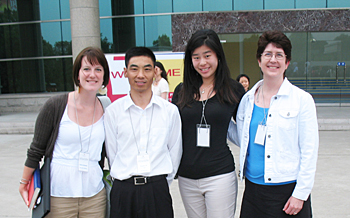
Dickson, professor of fashion and apparel studies, said that a trip she and two of her students took to Shanghai this summer confirmed the program's timeliness and viability in preparing fashion students for solving real-world problems in today's apparel industry.
Dickson, who heads UD's Department of Fashion and Apparel Studies and also serves on the board of directors of the Fair Labor Association (FLA), attends an annual FLA directors' meeting held each summer outside the United States. When she learned that this year's event was to be held in Shanghai, she said she thought there could be no better experience for fashion students than a trip that would expose them to real-world debates in an epicenter of the apparel industry.
Following this hunch, she invited a handful of UD fashion undergraduates enrolled in the certificate program to come along. Two of those students--Emily Robinson, a senior apparel design major; and Rita Chang, a junior dean's scholar double-majoring in fashion merchandising and political science--jumped at the chance.
“The concept of human rights and labor issues in the apparel industry is fairly new to me,” said Robinson, who is currently interning with Phillips-Van Heusen in its Global Human Rights and Social Responsibility department in New York City. “So when Dr. Dickson offered up this once-in-a-lifetime opportunity, I couldn't pass it up.”
After securing Alumni Enrichment Awards to help cover the costs of the trip, Robinson and Chang flew with Dickson to China, where they shadowed her through four days of FLA stakeholder forums and board of directors meetings. To cap the experience, they got the additional bonus of two guided tours through apparel factories and a quality control plant.
“While pursuing my undergraduate degree in apparel design, I had started to feel like something was missing--a passion that I couldn't put my finger on,” Robinson said. “But when I started the certificate program last fall, that void was filled with information that really altered my previously chosen career path. Now I will definitely incorporate some form of social responsibility into my future, rather than simply designing without purpose or conscience. Attending the meetings and stakeholder forum in Shanghai, as well as visiting actual apparel factories, helped open my eyes to what is actually going on every day in the industry.”
During the trip, Chang interviewed policymakers in the apparel industry for an independent service-learning project she is completing this summer. She said that the experience gave her the opportunity to sound out industry leaders on unethical purchasing practices in the apparel industry.
“One of my goals going in going to the meetings was to hear as many opinions as possible on the current issue of unethical purchasing practices,” Chang said.
“I was also able to speak with people from different industries and positions, including the head of Adidas social and environmental affairs of Asia Pacific, the director of the U.S. Department of Labor Office of Trade and Labor Affairs, the FLA sustainable compliance manager, and the Nike director of compliance integration and collaboration,” she said. “I spoke with them on their experiences in the industry in terms of the negative series of events they have witnessed in the supply chain, and one person told me how several times at her company the designers changed small details--such as the placement of a pocket or the color of a button--at the last minute, and how this trivial change had huge consequences for the factory workers, who weren't paid overtime.”
Though seemingly trivial, it was exactly these sorts of tiny, last-minute changes--and more importantly, the labor woes that ensued because of them, Dickson explained--that in fact ushered in huge changes in the apparel industry in terms of fair labor practices.
Forced to work long shifts for which they were not compensated, apparel industry workers in developing countries were being harshly exploited, it was discovered; and in the wake of this exposure, entire divisions were formed at major retailers, such as Nike, Adidas and Gap, that focused exclusively on labor compliance issues.
“What is really ironic is that while there were these divisions being formed,” Dickson said, “the ideas that they were promoting weren't being integrated throughout the whole company. Just down the hall, designers and merchandisers and buyers--major players in the apparel industry--were making the last-minute changes to orders that caused so many unfair labor practices to continue. Meanwhile, schools and fashion programs were continuing to turn out more designers and merchandisers who weren't aware of the problems they caused with such last-minute changes.”
Now, Dickson added, UD's certificate program in socially responsible and sustainable apparel business--a graduate-level, Internet-driven, nine-credit course that's the only one of its kind offered anywhere--addresses this and other labor issues in the apparel industry.
“In the program as it's set up now, students can chose to specialize in labor rights or environmental sustainability, and then take common core courses that will help them implement socially responsible practices in the apparel industry,” Dickson said. “And because it's online, students can be wherever. We purposely set it up that way, because there is nothing like this program in the world. Currently, we have students from New York City, Colorado and Taiwan. It's the first and only program of its kind that specifically focuses on social responsibility in the apparel industry.”
Article by Becca Hutchinson
Photo courtesy of Rita Chang, CHEP '09

